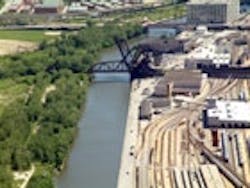Groups Sue to Stop Chicago Water Regulators from Polluting the Chicago River
A coalition of conservation groups have sued to stop the Metropolitan Water Reclamation District from dumping raw sewage mixed with storm water, as well as algae-fueling pollution, into the Chicago River system. Effluent from the district’s sewage treatment plants and combined sewer overflow pipes regularly violate Clean Water Act standards in the river, impacting downstream waters from Chicago all the way to the Gulf of Mexico, according to the suit.
NRDC, Sierra Club and Prairie Rivers Network officials filed a federal lawsuit Tuesday in the Northern District of Illinois over the regional water treater’s pollution problem. The suit points to discharges of pollution from treatment plants that regularly violate federal standards requiring that discharges not cause or contribute to low levels of oxygen, which fish need to breath.
District officials manages water infrastructure in the nearly 900 sq mi region in Cook County. Plants are authorized to release over a billion gal of wastewater every day to Chicago waters, and that wastewater contains large amounts of phosphorus.
Excess phosphorus acts as an unnatural fertilizer triggering growth of algae, aquatic plants and bacteria that block sunlight needed by other aquatic life, sucks the oxygen out of the water, and can potentially be toxic.
Source: Natural Resources Defense Council
